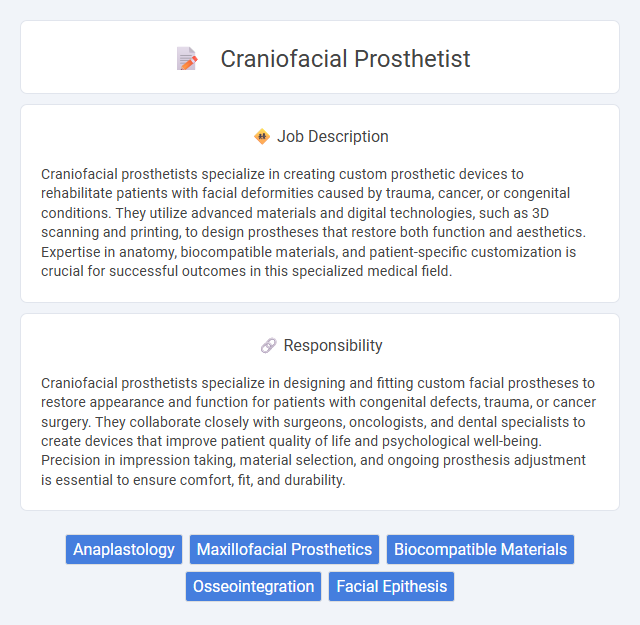
Craniofacial prosthetists specialize in creating custom prosthetic devices to rehabilitate patients with facial deformities caused by trauma, cancer, or congenital conditions. They utilize advanced materials and digital technologies, such as 3D scanning and printing, to design prostheses that restore both function and aesthetics. Expertise in anatomy, biocompatible materials, and patient-specific customization is crucial for successful outcomes in this specialized medical field.
Individuals with strong empathy and attention to detail are likely well-suited for a career as a craniofacial prosthetist, given the sensitive nature of working with patients who have facial disfigurements or congenital anomalies. Those comfortable with combining medical knowledge, artistry, and technical skills may find this job a good fit, while individuals who prefer less patient interaction or manual precision might face challenges. Probability suggests that traits such as patience, manual dexterity, and emotional resilience are critical for success in this specialized healthcare role.
Qualification
Craniofacial prosthetists require specialized training in maxillofacial prosthetics, typically including a degree in prosthetics and orthotics or a related healthcare field. Certification from recognized bodies such as the American Board for Certification in Prosthetics, Orthotics & Pedorthics (ABC) is often necessary to validate expertise. Advanced knowledge in anatomy, materials science, and clinical techniques is essential to design and fabricate custom facial prostheses for patients with congenital defects or trauma.
Responsibility
Craniofacial prosthetists specialize in designing and fitting custom facial prostheses to restore appearance and function for patients with congenital defects, trauma, or cancer surgery. They collaborate closely with surgeons, oncologists, and dental specialists to create devices that improve patient quality of life and psychological well-being. Precision in impression taking, material selection, and ongoing prosthesis adjustment is essential to ensure comfort, fit, and durability.
Benefit
A career as a craniofacial prosthetist likely offers significant emotional rewards through restoring patients' appearance and confidence after traumatic injuries or surgeries. The job probably provides a unique blend of healthcare and artistry, attracting those interested in both medical science and creative problem-solving. Career stability and the potential for specialized expertise in a growing healthcare niche may also contribute notable benefits.
Challenge
Craniofacial prosthetists likely face the challenge of creating highly individualized prostheses that must balance aesthetics, functionality, and patient comfort. Precision in matching skin tone and texture may require advanced artistic skills alongside technical expertise. The emotional and psychological impact on patients might add complexity to the prosthetist's role, demanding empathy and strong communication abilities.
Career Advancement
Craniofacial prosthetists specialize in creating custom prosthetic devices for patients with facial deformities or defects, using advanced materials and technologies such as 3D imaging and biomaterials. Career advancement opportunities often include specializing in subfields like ocular or nasal prosthetics, pursuing certification through organizations like the American Academy of Maxillofacial Prosthetics, or moving into clinical management and research roles. Continuous professional development and collaboration with multidisciplinary medical teams enhance prospects for leadership positions and innovative contributions to craniofacial rehabilitation.
Key Terms
Anaplastology
A Craniofacial Prosthetist specializing in Anaplastology creates custom facial prostheses to restore the appearance and function of patients with congenital defects, trauma, or cancer-related deformities. Expertise in material science, impression techniques, and color matching is critical for fabricating lifelike prosthetic ears, noses, or eyes, enhancing patient confidence and quality of life. Collaboration with surgeons, oncologists, and speech therapists ensures comprehensive rehabilitation tailored to individual anatomical and psychological needs.
Maxillofacial Prosthetics
Craniofacial prosthetists specializing in maxillofacial prosthetics design and fabricate custom prosthetic devices to restore facial structures affected by trauma, cancer, or congenital defects. Using advanced materials and digital technologies like 3D scanning and printing, they create implants that improve both function and aesthetics for patients. Collaboration with surgeons, oncologists, and speech therapists ensures comprehensive rehabilitation and optimal patient outcomes.
Biocompatible Materials
Craniofacial prosthetists specialize in creating prosthetic devices that restore facial features lost due to trauma, surgery, or congenital conditions using advanced biocompatible materials like medical-grade silicone and titanium alloys. These materials are crucial for ensuring skin compatibility, durability, and patient comfort while minimizing allergic reactions and tissue irritation. Expertise in selecting and manipulating biocompatible polymers and composites enhances the prosthesis's functionality and aesthetic integration with the patient's natural tissues.
Osseointegration
Craniofacial prosthetists specialize in designing and fitting prosthetic devices for patients with facial defects, often utilizing osseointegration techniques to anchor implants directly into the bone. Osseointegration enhances prosthetic stability and comfort by securely attaching titanium implants to the craniofacial skeleton, enabling improved retention for facial prostheses. Expertise in surgical collaboration and advanced materials is essential for optimizing outcomes in craniofacial rehabilitation through osseointegrated prosthetics.
Facial Epithesis
A Craniofacial prosthetist specializes in designing and fitting facial epitheses to restore appearance and function after trauma, surgery, or congenital defects. Utilizing advanced materials like medical-grade silicone and 3D scanning technology, they create customized prosthetics that blend seamlessly with the patient's skin tone and texture. Their expertise significantly improves patients' quality of life by enhancing facial symmetry and boosting psychological well-being.
 kuljobs.com
kuljobs.com